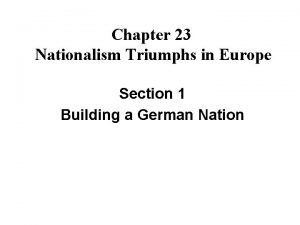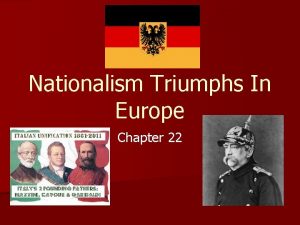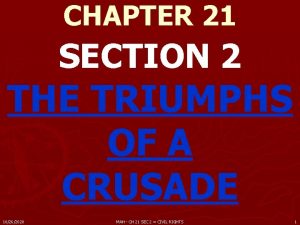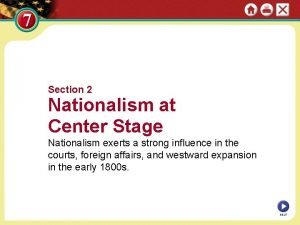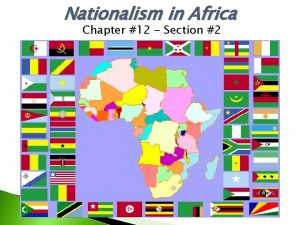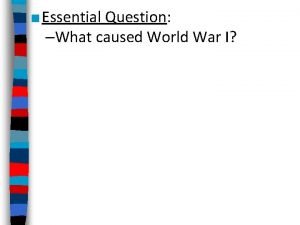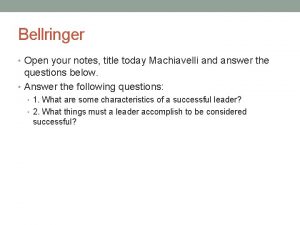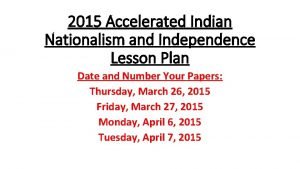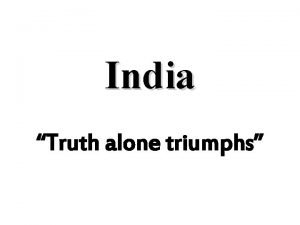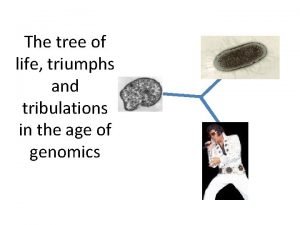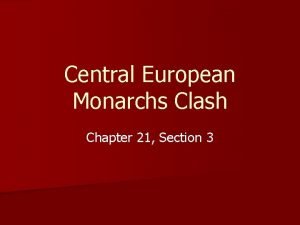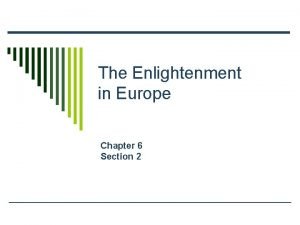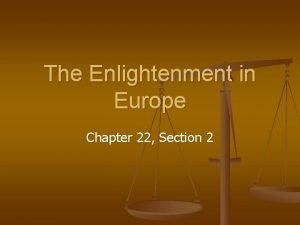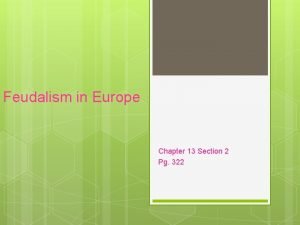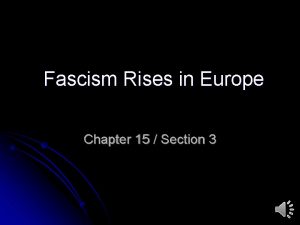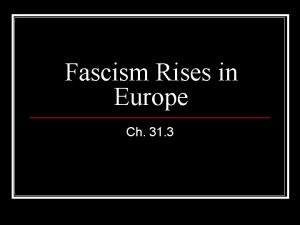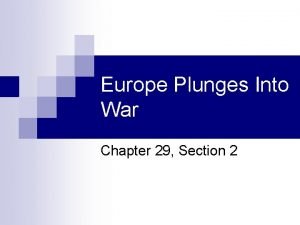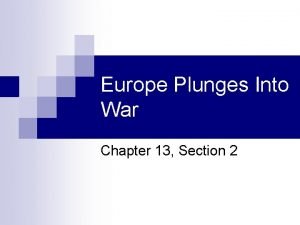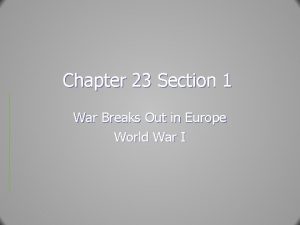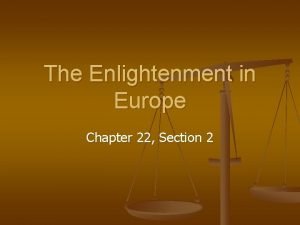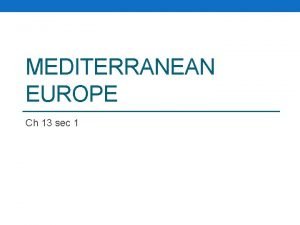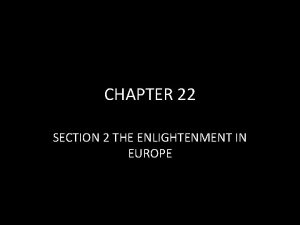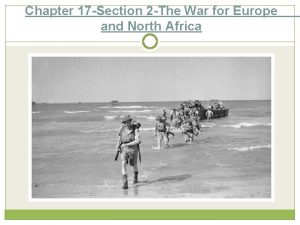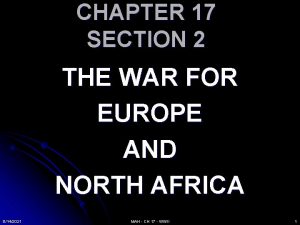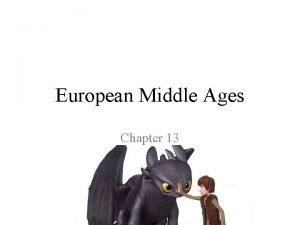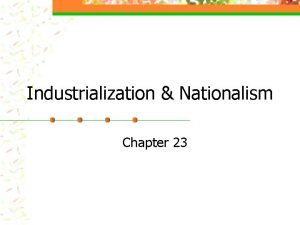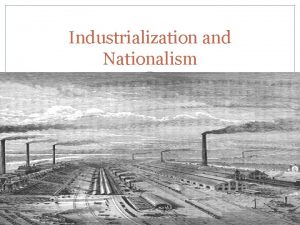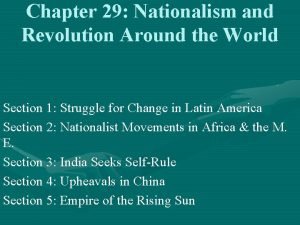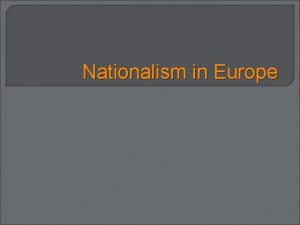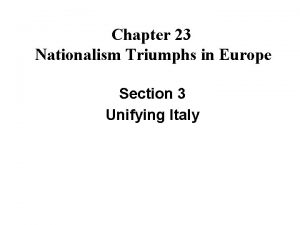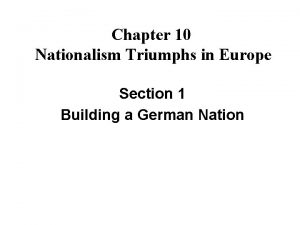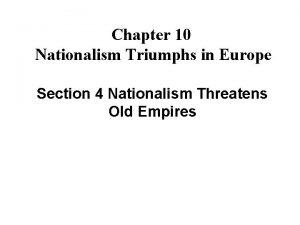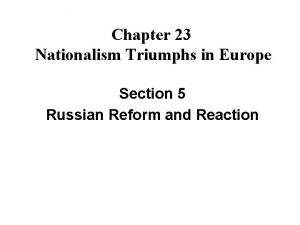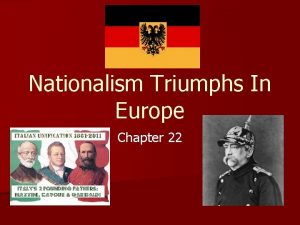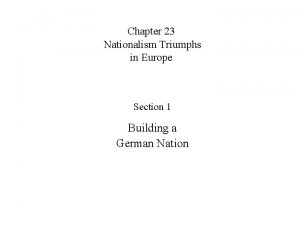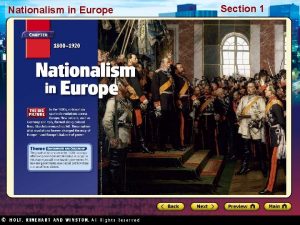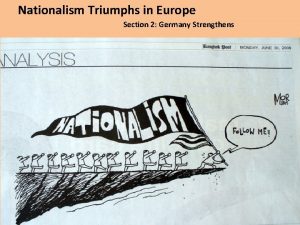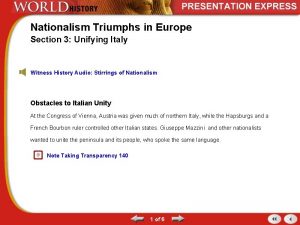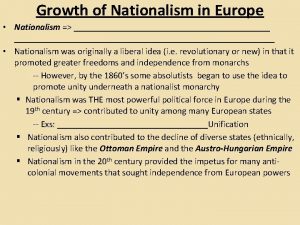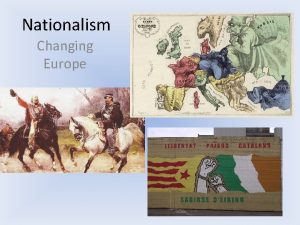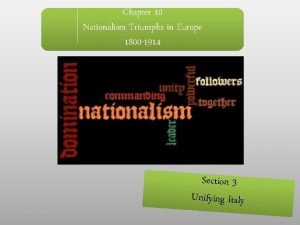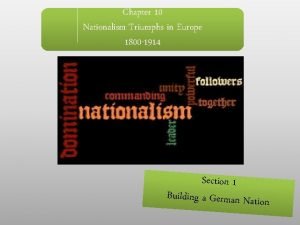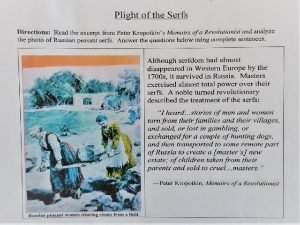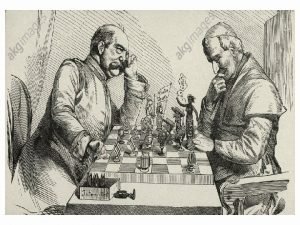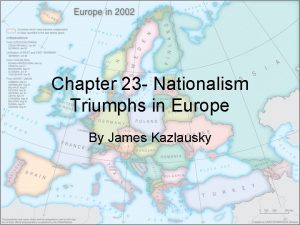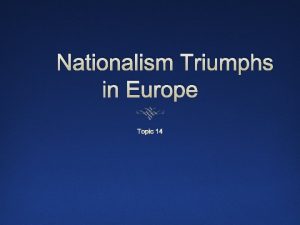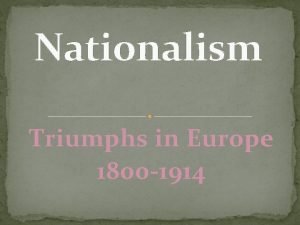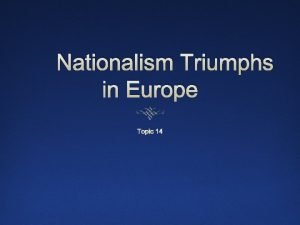Chapter 23 Nationalism Triumphs in Europe Section 1


































- Slides: 34

Chapter 23 Nationalism Triumphs in Europe Section 1 Building a German Nation

Chapter 23 Nationalism Triumphs in Europe Aim: should nationalism be seen as a force for unity or a cause of division and hatred? Do Now: Faces of Nationalism, 1 -7

1. What is a Nation? -not a state -not a political entity Usually thought of as combining: -common history -common language [problem in Eastern Europe] -common religion -self-awareness of group status

Impact of the French Revolution: Liberty, Equality and Fraternity French revolutionary ideas stressed the rights of the people. The people come to have their own significance as a unit

Reaction to French Revolution . The French spread their ideals all over Europe. But they dominated the other countries.

People in these other countries took up the ideals of the French Rev. and applied them to their own situation, especially in Germany.

Romanticism An intellectual reaction against the Enlightenment emphasis on reason. Looked more to emotion and feeling as sources of truth. This had been growing up in Germany in the late 18 th/early 19 th Century.

Liberal Nationalism • Nationalism was initially linked with Liberals who, especially in Germany and Italy lead the call for unity versus the old rulers.

Liberal Nationalism • The idea of the people making up the nation and nationalism can go well together - idea of popular sovereignty.

Failure of Liberal Nationalism in 1848

I. Steps Toward Unity In the early 1800 s, German-speaking people lived in a number of kingdoms, Prussia, and the Austrian Hapsburg empire

I. Steps Toward Unity Between 1807 and 1812, Napoleon organized many German states into the Confederation of the Rhine

I. Steps Toward Unity 1815 - The Congress of Vienna created the German Confederation, a weak alliance headed by Austria

I. Steps Toward Unity In the 1830 s, Prussia created an economic union between German states called the Zollverein

I. Steps Toward Unity 1848 – The Frankfurt Assembly demanded a united Germany under Prussia, but were turned down by Fredrick William IV

II. Bismarck and German Unity 1862 - Otto von Bismarck, a diplomat from Prussia's Junker class, was named as chancellor Chancellor of Germany Period in office: 1871– 1890 Date of birth: 1 April 1815 Date of death: 30 July 1898

II. Bismarck and German Unity As Chancellor, Bismarck succeeded in uniting the German states under Prussian rule

II. Bismarck and German Unity Bismarck was a master of Realpolitik – realistic politics based on the needs of the state This 1887 American political cartoon depicts Bismarck balancing the figures of war and peace on a teeter-totter made up of a powder keg and a board named "European politics". At the same time, he is juggling the great powers of Europe. An artillery piece lies in the foreground.

The less people know about how sausages and laws are made, the better they'll sleep at night. -- Otto von Bismarck

"Never believe in anything until it has been officially denied. " -Otto von Bismarck

“The great questions of the day will not be settled by speeches and majority decisions – that was the mistake of 1848 and 1849 – but by blood and iron. ” Otto von Bismarck

II. Bismarck and German Unity Bismarck built up the army and fought three wars, increasing Prussian power and paving the way for German unity Franco-Prussian War

The Danish War, 1864

II. Bismarck and German Unity 1864 - Bismarck formed an alliance with Austria and seized the provinces of Schleswig and Holstein from Denmark

The Austro-Prussian (7 Weeks) War

II. Bismarck and German Unity 1866 - Bismarck attacked Austria annexed several other north German states

II. Bismarck and German Unity Bismarck dissolved the German Confederation and created a Prussian dominated confederation

The Franco. Prussian War, 1870 -71

II. Bismarck and German Unity A growing rivalry between France and Prussia led to the Franco-Prussian War of 1870

II. Bismarck and German Unity Napoleon III declared war on Prussia after the “Ems dispatch” but was defeated within a few weeks Stone of Benedetti - Ems dispatch A memorial stone reminding of the fatal correspondence between King Wilhelm I of Prussia and the french ambassador Earl Benedetti. The telegraphic message of the prussian king to Berlin, which entered history books under the name of "Ems Dispatch" and the shortened version of the contents, which was published in the press by Otto Graf of Bismarck on July 13, 1870, led to the outbreak of the Franco-Prussian War 1870/1871.

The Prussians surrounded Paris, set up their HQ at the Palace of Versailles, to the SW, and were able to bombard much of the city with Krupps' big new cannons.

Germans abusing French

III. The German Empire January 1871 - William I of Prussia took the title Kaiser and German nationalists celebrated the birth of the Second Reich On the 18 th January 1871, in the Hall of Mirrors at Versailles, King William I of Prussia was proclaimed by all the states of Germany to be their emperor.

III. The German Empire A constitution drafted by Bismarck set up a two -house legislature - the appointed Bundesrat, and the elected Reichstag
 Nationalism triumphs in europe
Nationalism triumphs in europe Nationalism triumphs in europe
Nationalism triumphs in europe Nationalism triumphs in europe
Nationalism triumphs in europe Chapter 21 section 2 the triumphs of a crusade
Chapter 21 section 2 the triumphs of a crusade Nationalism at center stage
Nationalism at center stage Chapter 12 section 2 answer key
Chapter 12 section 2 answer key The missouri compromise what ideas did the measure contain
The missouri compromise what ideas did the measure contain What caused wwi
What caused wwi Nationalism in europe notes
Nationalism in europe notes Indian independence lesson plan
Indian independence lesson plan Truth alone triumphs meaning in hindi
Truth alone triumphs meaning in hindi Triumphs and tribulations
Triumphs and tribulations Where were the early axis triumphs
Where were the early axis triumphs Hapsburg triumphs
Hapsburg triumphs Chapter 6 section 2
Chapter 6 section 2 Chapter 22 the enlightenment in europe
Chapter 22 the enlightenment in europe Feudalism in europe chapter 13 section 2
Feudalism in europe chapter 13 section 2 Chapter 31 section 3 fascism rises in europe
Chapter 31 section 3 fascism rises in europe Chapter 31 fascism rises in europe
Chapter 31 fascism rises in europe Chapter 29 europe plunges into war
Chapter 29 europe plunges into war Chapter 13 section 2 guided reading europe plunges into war
Chapter 13 section 2 guided reading europe plunges into war Chapter 23 section 1 war breaks out in europe
Chapter 23 section 1 war breaks out in europe The enlightenment in europe section 2
The enlightenment in europe section 2 Chapter 13 section 1 mediterranean europe
Chapter 13 section 1 mediterranean europe Chapter 22 section 2 the enlightenment in europe
Chapter 22 section 2 the enlightenment in europe Chapter 17 section 2 the war for europe and north africa
Chapter 17 section 2 the war for europe and north africa Chapter 17 section 2 the war for europe and north africa
Chapter 17 section 2 the war for europe and north africa Chapter 15 section 3 fascism rises in europe
Chapter 15 section 3 fascism rises in europe Chapter 31 section 3 fascism rises in europe
Chapter 31 section 3 fascism rises in europe Chapter 13 section 2 feudalism in europe
Chapter 13 section 2 feudalism in europe Industrialization and nationalism
Industrialization and nationalism Chapter 10 lesson 1 the industrial revolution
Chapter 10 lesson 1 the industrial revolution Chapter 10 industrialization and nationalism
Chapter 10 industrialization and nationalism Chapter 35 nationalism and political identities in asia
Chapter 35 nationalism and political identities in asia Chapter 29: nationalism around the world answers
Chapter 29: nationalism around the world answers
